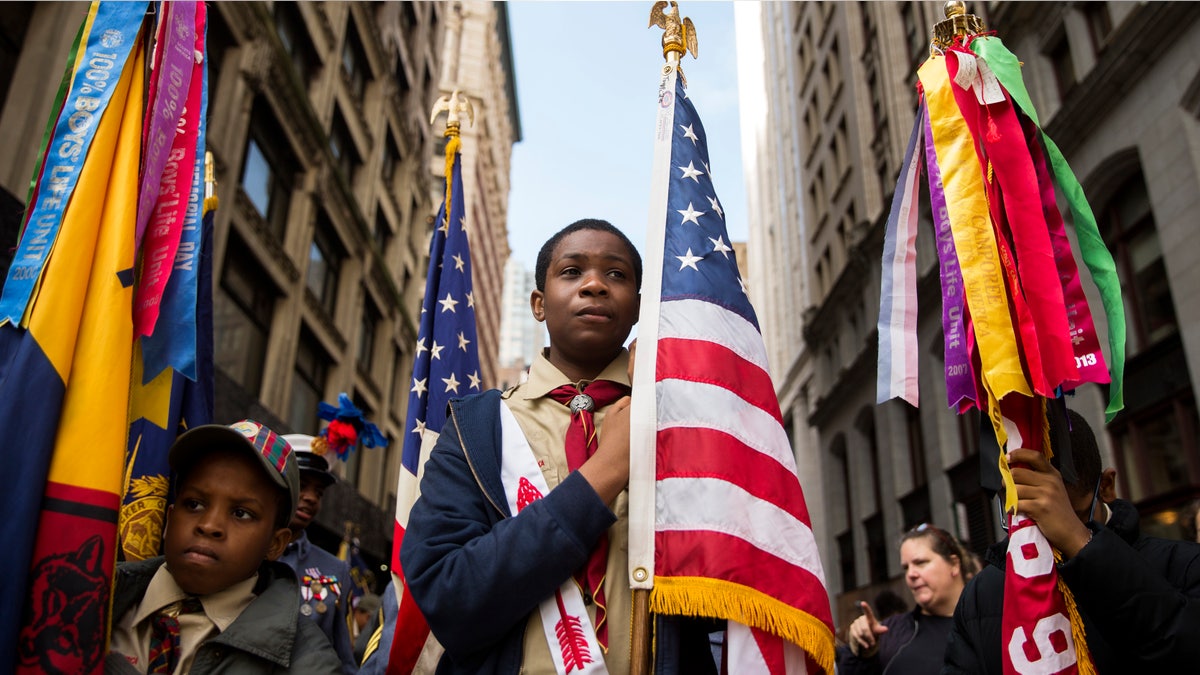
Nov. 11, 2014: Members of the Boy Scouts wait to march in the Veterans Day parade on 5th Avenue in New York. (Reuters)
Welcome to the lost boy generation. Only a few have shot up schools, but too many are failing out of them.
The left side of the American political spectrum blames “toxic masculinity” for this—a term they define as anything fist-pumping macho.
The left’s solution, if you believe recent essays in The New York Times and so on, is to have boys act more like women.
They say a masculine upbringing creates monsters as they conveniently forget that more boys than ever are being raised without fathers in their homes. They also don’t appreciate the cultural fallout from Hollywood presenting the male role model as an Archie Bunker, Al Bundy … pop-culture joke. They refuse to appreciate that modern feminism has purposely done all it can to kill the gentleman.
To those on the left who consider manliness to be a synonym for sexism, male hubris, “mansplaining” and the like I ask: Is a man or boy who is so insecure he has to prop up his own ego by putting down women really manly?
Obviously not.
All real rites of passage have moral codes as their foundations, as without them the change isn’t lasting.
The thing is there is a practical and time-tested way to turn boys into upstanding men. Cultures across the world have developed these same steps, albeit often with wildly different rituals, because they work.
1. Help Them Choose and Chase an Ideal
No transformative rite of passage can begin until a boy (or a girl for that matter, as this is really a question of character not chromosomes) sees an archetype they want to be. The Boy Scouts know this. They have a clear ideal that presents a beginning to a real rite of passage. An ideal might be epitomized by their favorite Olympic athlete (maybe swimmer Michael Phelps or snowboarder Chloe Kim) or a singer or whatever they are excited about.
Few parents appreciate the human element of making this a who instead of a what. Today we are often taught to try different things as we search for a calling. When a boy finds something that pleases him he is supposed to simply do that. They’re not asked to understand what they’re chasing. This is an almost impossible thing to accomplish in a world of visual distractions. Many become lost on such dark and uneven roads to manhood.
2. Don’t Save Them from Fear
All real rites of passage have scary things in them to overcome. This is why videogames and other alternate realities can never really build character—they are not real.
In the Boy Scouts this fear might be darkness on a campout. It might be fear of not succeeding in front of peers. A boy might be afraid of being tackled or of missing a pass in a game. These fears are there to be overcome. Each time they are, character is built. Confidence grows. You’ll see a teenager’s “whatever” glare turn into a smile when this happens.
3. Be a Good Guide
Your job is to be a guide, to show the way. Stand back and be emblematic of the role. Explain when they ask questions, but let them discover. No matter how well you explain they won’t see or accept your point of view completely, as theirs is very different. Still, a guide is critical. Rites of passage go astray without a sensei, drill sergeant, coach or teacher. (Beware though: a poor guide can ruin a boy.)
4. Let Them Run the Gauntlet
Whether they are trying to be the next Derek Jeter or Neil deGrasse Tyson, the ideal they chase will take them into a gauntlet. It’s hard work to earn those Boy Scout patches or to learn to play the piano. Each real endeavor presents a gauntlet they must overcome on their own. You just need to be there as a guide and, as you do, be as nonjudgmental as you can.
Ask anyone who coaches kids and they’ll tell you the biggest problem is the parents—first those that aren’t there for their children; next, the parents who think it’s all about them; and, maybe worst of all, the parents who refuse to let their kids fail.
5. Introduce a Code
All real rites of passage have moral codes as their foundations, as without them the change isn’t lasting. This is why the Boy Scouts have a code. This is why sports also have rules of conduct. Talk to them about this and help them write down their own code. The best way to do this is to talk about the ideal they’re pursuing and then to discuss the rules this ideal lives by. My book This Will Make a Man of You is organized according to these steps and has dozens of real codes in the back to help anyone formulate a code relevant for them.
6. Let Them Go
If they struggle yet endure they will be accepted among peers on team, band, dojo, club or other groups who are all following the same ideal. Stand back now and let them go. They are okay and have taken big steps toward become honorable members of society. They’ll need you again when they start chasing their next ideal, as we are never really done challenging ourselves as we chase new heroes toward all we want to be.




















